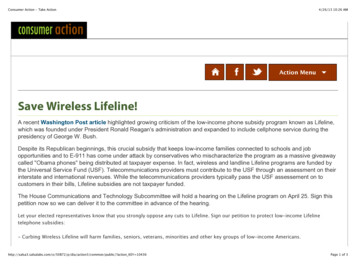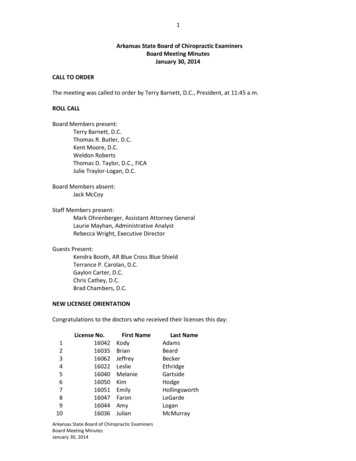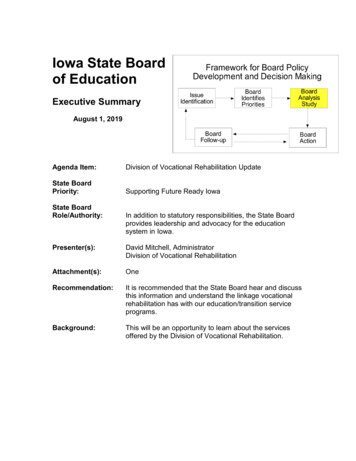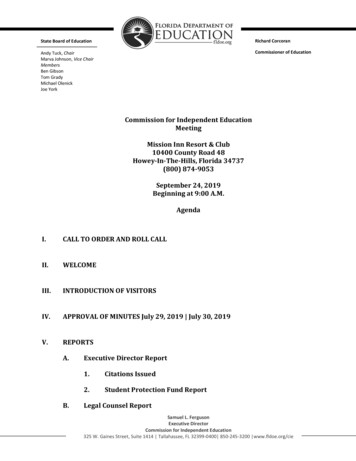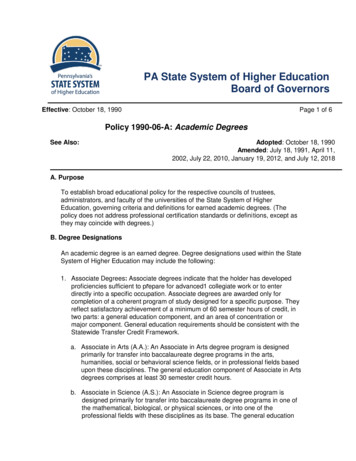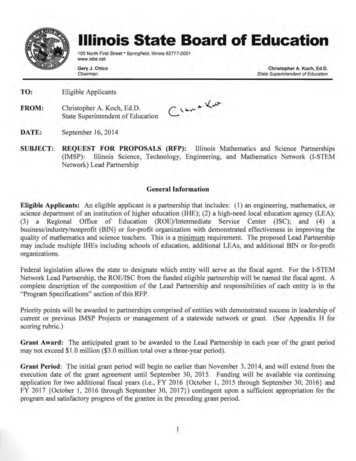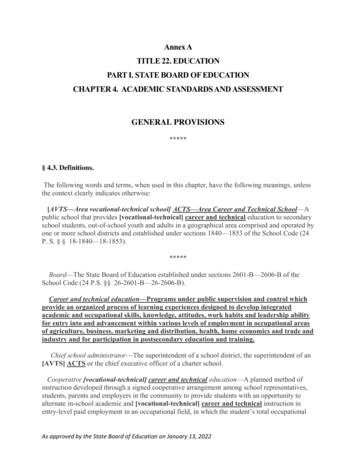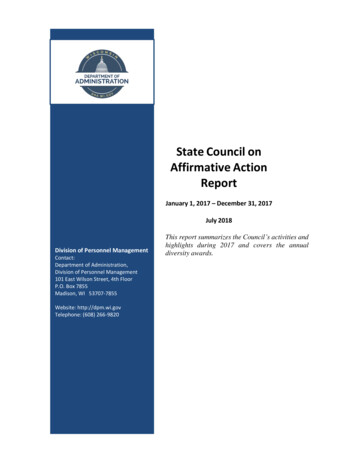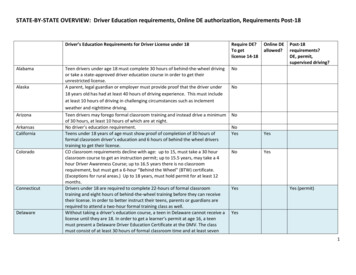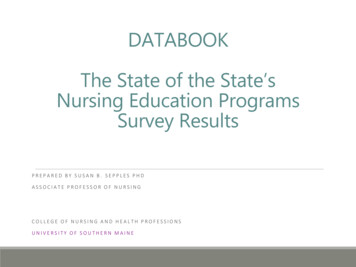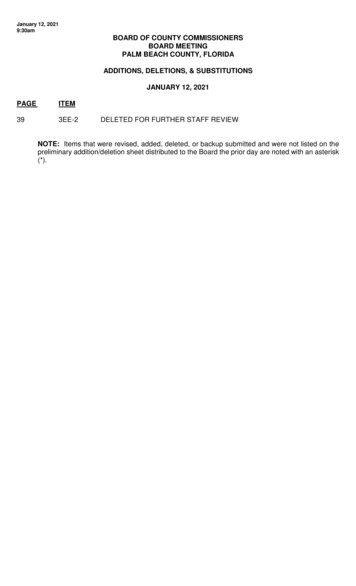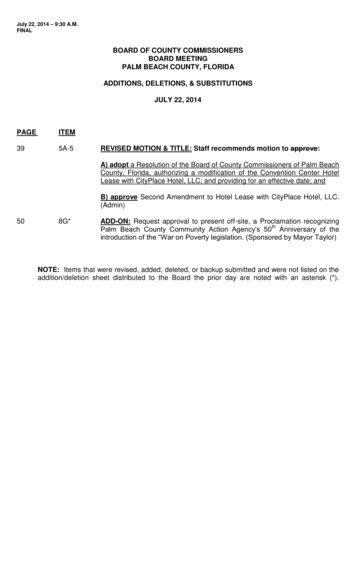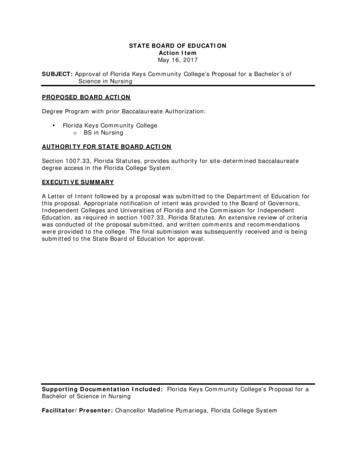
Transcription
STATE BOARD OF EDUCATIONAction ItemMay 16, 2017SUBJECT: Approval of Florida Keys Community College’s Proposal for a Bachelor’s ofScience in NursingPROPOSED BOARD ACTIONDegree Program with prior Baccalaureate Authorization: Florida Keys Community Collegeo BS in NursingAUTHORITY FOR STATE BOARD ACTIONSection 1007.33, Florida Statutes, provides authority for site-determined baccalaureatedegree access in the Florida College System.EXECUTIVE SUMMARYA Letter of Intent followed by a proposal was submitted to the Department of Education forthis proposal. Appropriate notification of intent was provided to the Board of Governors,Independent Colleges and Universities of Florida and the Commission for IndependentEducation, as required in section 1007.33, Florida Statutes. An extensive review of criteriawas conducted of the proposal submitted, and written comments and recommendationswere provided to the college. The final submission was subsequently received and is beingsubmitted to the State Board of Education for approval.Supporting Documentation Included: Florida Keys Community College’s Proposal for aBachelor of Science in NursingFacilitator/Presenter: Chancellor Madeline Pumariega, Florida College System
BACCALAUREATE PROPOSAL APPLICATIONForm No. BAAC-02Section 1007.33(5)(d), Florida Statutes, and Rule 6A-14.095, F.A.C., outline therequirements for a Florida College System baccalaureate program proposal. Thecompleted Proposal form shall be submitted by the college president to the Chancellorof the Florida College System at ChancellorFCS@fldoe.org. In addition, a printed versionshall be mailed to the Division of Florida Colleges at 325 West Gaines Street, Suite 1544,Tallahassee, Florida 32399-0400.The proposal requires completion of the following components: Program summary Program description Workforce demand and unmet need Planning process Enrollment projections and funding requirements Student costs: tuition and fees Program implementation timeline Facilities and equipment specific to program area Library and media specific to program area Academic content Program termination Appendix tables Supplemental materialsFlorida College System Institution Name:Florida College System Institution President:PROGRAM SUMMARY1.1Program Name:1.2Degree type:1.31.41.51.61.7How will the program be delivered(check all that apply):List the counties in the college’sservice district:Degree CIP code (4 or 6 digit):Anticipated program implementationdate:What is the primary associate degreepathway for admission to theprogram?Florida Keys Community CollegeDr. Jonathan GueverraBachelor of Science in NursingX Bachelor of Bachelor ofScienceApplied Science Face-to- X Hybrid OnlinefaceonlyMonroe County51.3801August 2018Associate of Science in Nursing (ADN)Incorporated in Rule 6A-14.095, Site Determined Baccalaureate Access Effective August, 2015Page 1 of 49
1.81.91.10Is the degree a STEM focus area? YesList program concentration(s) (ifapplicable):Will the program be designated suchX Yesthat an eligible student will be able tocomplete the program for a total costof no more than 10,000 in tuition andfees?X No NoPROGRAM DESCRIPTION2.1Describe the program.Florida Keys Community College (FKCC) proposes to initiate a RegisteredNurse to Bachelors of Science in Nursing (BSN) degree program for nurseswith clear and active registered nurse licenses. The future ACEN accredited,BSN program will be a state approved program including coursework innursing research, nursing theory, pharmacology, health assessment, nursingmanagement and quality improvement. Graduates will acquire specializedknowledge and skills in the field of nursing to meet the burgeoning demandsof working in a variety of healthcare settings. The BSN program willemphasize an acute leadership practicum where the student will learn tointegrate theory with practice with the goal of becoming reflectivepractitioners in nursing.The FKCC BSN program will use a combination of online learning, clinical andexperiential experiences, and face–to-face lectures. Online learning will beprovided in both asynchronous and synchronous modes using the College’slearning management system. Any synchronous activities will be scheduledin advance and at multiple times to accommodate student work schedules.Students will work with faculty to arrange clinical experiences near theirplace of residence and/or employment. The BSN program will also provideweekend seminars where students will participate in various learningactivities to enrich, reinforce, and apply the knowledge gained throughoutthe program of study. These seminars will be scheduled in advance and heldonce per semester to allow for students to coordinate these experiences withpersonal and work schedules.As outlined by the American Association of Colleges of Nursing (AACN),graduates of the FKCC BSN program will be able to: practice from a holistic, caring framework; practice from an evidence base; promote safe, quality patient care; use clinical/critical reasoning to address simple to complex situations;Page 2 of 49
assume accountability for one’s own and delegated nursing care;practice in a variety of healthcare settings;care for patients across the health-illness continuum;care for patients across the lifespan;care for diverse populations;engage in care of self in order to care for others; andengage in continuous professional developmentThe RN to BSN program was not considered eligible to meet the 10Kchallenge due to the total cost of the 2 2 model. The tuition for the BSNcomponent is estimated to be 6,168. The cost of the FKCC ADN program iscurrently 10,148. The total cost of the RN to BSN program would equal 16,341 (Table 1). FKCC has maintained the same tuition level for the lastfour consecutive years while reducing many types of fees and implementingprograms to eliminate student debt. As a result, the College shall continue toseek ways to reduce the tuition burden placed on students in the BSN andevery program in our portfolio.Table 1: Estimated Cost of ADN, RN to BSN and Combined CostADNRN to BSNTotal CostTuition 7,863 6,168 14,031Lab fees 2,285 25 2,310Total 10,148 6,193 16,341Source: FKCC Catalog, and Lab Fee Schedule. Based on cost per credit hour of 109.22 lower level and 128.50baccalaureate level.WORKFORCE DEMAND AND UNMET NEED3.1Describe the career path and potential employment opportunities forgraduates of the program.In offering the BSN program, FKCC will be able to provide multiple careerpathways for students throughout the Florida Keys. Students could enterthe ADN program directly and then transition to the BSN program. Studentsmay also choose to begin with either the Certified Nursing AssistantProgram (CNA) or Emergency Medical Technician Program (EMT) as entrylevel positions into healthcare. CNA or EMT students would be able toapply credits earned to other healthcare degrees, including the ADN or RNto BSN degrees based on statewide articulation agreements.Obtaining a BSN will provide students the opportunity to advance theircareers. Many healthcare organizations offer additional compensation forobtaining a BSN. Graduates of the BSN program will also be prepared to fillleadership, quality improvement, and management positions, which requirea BSN or equivalent degree. In addition, the BSN prepared student will nowPage 3 of 49
be able to apply for advanced nursing practice education programs. Theseadvanced practice programs include a Master of Science in Nursing, NursePractitioner, Master in Nursing Education, PhD. in Nursing, and Doctorate ofNursing Practice (DNP).The U.S. Bureau of Labor and Statistics states that the mean salary for aregistered nurse is 62,720 per year. The most recent statistics provided bythe U.S. Bureau of Labor and Statistics indicates that employment for nurseswas nearly 2.7 million, making it one of the largest occupations in thenation. The top ten percent of nurses earned 98,880 per year or more.Table 2: Advanced Practice Nursing PositionsOccupationMean SalaryNurse Educator 72,000Nurse Midwife 88,350Nurse Practitioner 95,780Nurse Anesthetist 145,740Source: U.S. Department of Labor, Bureau of Labor Statistics.The positions listed above most often require a graduate degree in nursing(Table 2). The BSN is required to enter graduate level nursing programs.By offering an RN to BSN degree at FKCC, students will be able to continuetheir nursing education at the graduate level and be eligible to fill thepositions listed above.As the College examined the feasibility of a BSN program, WomanKind andthe Lower Keys Medical Center highlighted a dual commitment toincreasing the number of BSN registered nurses and advanced practicenurses. WomanKind is a medical center providing high-quality familyplanning and primary health care to people of all income levels. The medicalcenter is located in Key West, Florida. WomanKind administrators arecommitted to increasing the number of advanced practice nurses employedat the medical center. As stated in the WomanKind letter of support, theaddition of an RN to BSN program at FKCC is a great first step in reachingthis goal.Lower Keys Medical Center (LKMC) is an advanced hospital which offersfull-service acute care including emergency, labor & delivery, physicaltherapy and cardio in the Lower Keys. LKMC administrators are determinedto increase the percentage of graduate prepared nurses at the facility.Currently, LKMC has only three full-time nurses who hold a graduatedegree.While the demand for nurse midwives and nurse anesthetists is expected toremain flat through 2023, registered nursing jobs are expected to increasePage 4 of 49
by 5%. According to EMSI, the demand for nurse practitioners in Monroecounty has grown by 15% over the last two years and is expected to growby 20% over the next 10 years. In addition, 33% of the nurse practitionerworkforce is expected to retire in the next 10 years. As reflected in Table 3,the median annual earnings for a nurse practitioner is 91,811.Table 3: Median Earnings Nursing Occupations Monroe CountyOccupationHourly RateAnnual SalaryRegistered Nurse (29-1141) 28.80 59,904Nurse Anesthetist (29-1151) 56.90 118,352Nurse Midwives (29-1161) 37.38 77,750Nurse Practitioner (29-1171) 44.14 91,811Source: EMSI Q2 2016 Data Sheet3.2Describe the workforce demand, supply and unmet need for graduates of theprogram that incorporates, at a minimum, the shaded information fromappendix tables A.1.1 to A.1.3.In December 2013, the U.S. Bureau of Labor Statistics EmploymentProjections 2012-2022 reported that Registered Nurse (RN) was listedamong the top occupations regarding job growth through 2022.Additionally, the RN workforce is expected to grow from 2.7 million in 2012to 3.24 million in 2022, an increase of 526,800 or 19%.FKCC is considered part of Workforce Region 23 according to the FloridaDepartment of Economic Opportunity. As reflected in Table A.1.1, it isestimated there will be 1,107 registered nursing job openings per yearthrough 2024 in Workforce Region 23. An additional 19 positions per yearare projected for postsecondary nursing instructors.The Florida Center for Nursing supports the Institute of Medicine’s goal tohave 80% of registered nurses educated at the baccalaureate level by 2020.To meet the annual demand for nurses in Workforce Region 23, we willneed 886 (1,107 annual job openings x 80%) nurses per year at thebaccalaureate level. The five year annual average of BSN graduates inWorkforce Region 23 is currently 763. This regional picture is verydeceptive as Monroe County’s unique geography and demography offer avery different reality.The most recent data from the Florida Center for Nursing (Table 4) indicatethere are approximately 597 nurses working in Monroe County. Of those,only 180 have a BSN or higher. Table 4 shows the gap between current BSNprepared nurses and the 80% goal. To reach the 80% target would requirethat 298 nurses in Monroe County obtain a BSN.Page 5 of 49
Table 4: Educational Level of Employed NursesAcademic Year 2012-13# of Employed Registered Nurses(ADNs BSNs)# BSNs80% Benchmark for RN with BSNGap Between Current BSN and GoalMonroe County597180478298Source: Florida Center for Nursing Status Report, July 2013Table 5 provides additional information on the workforce distribution ofnurses in Monroe County.Table 5: Nursing Work Setting- Monroe CountySetting% of WorkforceHospital65Home Health7.1Public Community6.4HealthPhysician Office5.4Ambulatory Care2.4Long Term Care1.7Nursing Academics5.4Other6.6Number of Nurses3884238321410539Source: Florida Center for Nursing Status Report, July 2013As stated previously, there are currently no institutions of higher educationlocated in Monroe County which offer a BSN program. FKCC is wellpositioned to assist Monroe County and the state in meeting this demandfor BSN nursing programs.3.3Describe any other evidence of workforce demand and unmet need forgraduates as selected by the institution, which may include qualitative orquantitative data information, such as local economic development initiatives,emerging industries in the area or evidence of rapid growth, not reflected inthe data presented in appendix tables A.1.1 to A.1.3. For proposed programswithout a listed SOC linkage, provide a rationale for the identified SOC code(s).Many healthcare institutions are now requiring new registered nurses tohold a BSN degree or to sign a contract to commit to beginning a BSNprogram within a specified time period. For example, Mariner’s Hospital inMonroe County requires any ADN nurse to obtain a BSN within 5 years ofemployment. These hiring practices are being utilized in response to thePage 6 of 49
Institute of Medicine’s (IOM) 2010 Report on the Future of Nursing. Thisreport set forth eight recommendations to be implemented for the future ofnursing. Recommendation four from the IOM calls for increasing theproportion of BSN prepared nurses to 80% by the year 2020.According to the Florida Center for Nursing (FCN), it is anticipated the stateof Florida will have a nursing shortage of 50,321 RN full-time equivalentpositions by 2025. The FCN also recommends increasing the number of BSNprepared nurses. The most recent FCN report estimates there are 269,760registered nurses in the state of Florida. Of those registered nurses, only49.1% have a BSN or higher, well short of the 2020 goal of 80% ofregistered nurses holding a BSN or higher (Table 6).As vacancy rates in urban centers increase it is foreseeable that the nursingshortage would be even greater in rural areas such as Monroe County, sinceurban medical centers have more resources available to attract nurses andgreater opportunities for career advancement. Anything that can be doneto retain local nurses will help offset predicted shortages. An RN to BSNprogram at FKCC would allow Monroe County nurses to continue theireducation in Monroe County. The uniqueness of the area may also attractother nurses into the area who are looking to continue their education.Table 6: BSN-Prepared Nurses in Florida# of Registered Nurses# of BSN or Higher80% BSN or Higher GoalGap Between Current BSN and GoalSource: Florida Center RN Supply Report, July 2014In Florida269,760132,452215,80883,356The data from FCN for Workforce Region 23 is similar to the rest of thestate. In the most recent report from 2011, 45% of registered nurses inWorkforce Region 23 hold a BSN or higher. In Monroe County, only 30% or180 nurses hold a BSN or higher.According to Report No. 15-04 from the Office of Program Policy Analysisand Government Accountability (OPPAGA), there are 175 nursing programsin Florida with 140 programs awarding an associate degree and 35programs awarding a BSN degree. There are 49,368 nursing seats availablefor LPN and RN education. To bring the current nursing population ofFlorida up to the 80% recommendation by the IOM and FCN would requiregraduating 83,356 BSN degree nurses by 2020 (Table 6). Clearly, there isnot enough capacity to meet this goal at this time. To compound the issue,these data do not account for the projected 13% job growth in nursing.Page 7 of 49
Status reports on nursing supply, demand, and education indicate a strongdemand for baccalaureate nursing degrees (Florida Center for NursingStatus Report, March 2014). As can be seen from Table 7, during theacademic year 2012- 2013, thirty-seven percent of qualified studentsstatewide were turned away from BSN programs because of limitedcapacity and other factors.Table 7. Bachelor of Nursing Program Capacity Academic Year 20122013Academic Year 2012-2013Florida BSN Programs# of Qualified Applicants5,917# of Students Enrolled3,711# of Non-Matriculated Applicants2,206% of Non-Matriculated Applicants37%# of RN-BSN Students Graduated2,026Source: Florida Center for Nursing Status Report, March 2014When looking at the South Florida Region it is clear that current supply isnot meeting projected demand. According to the most recent report fromthe Florida Center for Nursing, registered nursing jobs in the South Floridadistrict grew by 4.1% from 37,835 in 2009 to 39,374 in 2011. These jobswere filled by 35,017 nurses, 50.5% of whom had an associate degree astheir highest earned degree. In 2011, there was an estimated 2,468 jobvacancies in South Florida despite the fact that South Florida schoolsgraduated 2,850 new nurses (72% at the ADN level). Most of thesevacancies were in hospital and home health based practice. During thissame time period, ADN nursing programs turned away 46% of qualifiedapplicants and 53% of qualified BSN applicants.3.4If the education level for the occupation identified by the Florida Departmentof Economic Opportunity presented in appendix table A.1.1 is below abachelor’s degree, provide justification for the inclusion of that occupation inthe analysis.While the Associate of Science in Nursing degree (ADN) is the minimumdegree required for registered nurses, many healthcare institutions are nowrequiring new registered nurses to have a BSN degree. Many employerswhich hire an ADN prepared nurse often require the new nurse to sign acontract to commit to beginning a BSN program within three to five years ofhire. These hiring practices are being utilized in response to the Institute ofMedicines (IOM) 2010 Report on the Future of Nursing. This report set fortheight recommendations to be implemented for the future of nursing.Recommendation four from the IOM suggests increasing the proportion ofBSN prepared nurses to 80% by the year 2020.Page 8 of 49
The Florida Center for Nursing also recommends increasing the number ofBSN-prepared nurses and advocates that the IOM goal of 80% BSNprepared nurses is necessary to improve the healthcare system in Florida.The American Nurses Association and The American Nurses CredentialingCenter (ANCC) all support increases in BSN prepared nurses to improvehealth outcomes of patients.The Magnet Designation for Nursing awarded by the ANCC also supportsincreasing the percentage of BSN prepared nurses in hospitals. BaptistHealth South Florida, a large employer of FKCC nursing graduates, iscomprised of six hospitals with locations in Monroe County, Homestead,and the Greater Miami area. Baptist Health South Florida has two hospitalswith Magnet Designation and is working towards obtaining MagnetDesignation for Nursing for three more hospitals.Baptist Health South Florida’s Mariner’s Hospital, located in Monroe Countyis recognized as a Pathway to Excellence by the ANCC. The Pathway toExcellence Program recognizes healthcare institutions for developing anenvironment where nurses can excel. Organizations that hold Pathwaydesignation have been shown to have higher nurse satisfaction, longerretention, easier recruiting, and high quality nursing care. There are a totalof 12 pathway practice standards. Criteria six focuses on professionaldevelopment of nurses. A component of this criterion is the attainment ofadditional degrees
practitioners in nursing. The FKCC BSN program will use a combination of online learning, clinical and experiential experiences, and face–to-face lectures. Online learning will be provided in both asynchronous and synchronous modes using the College’s learning manage
